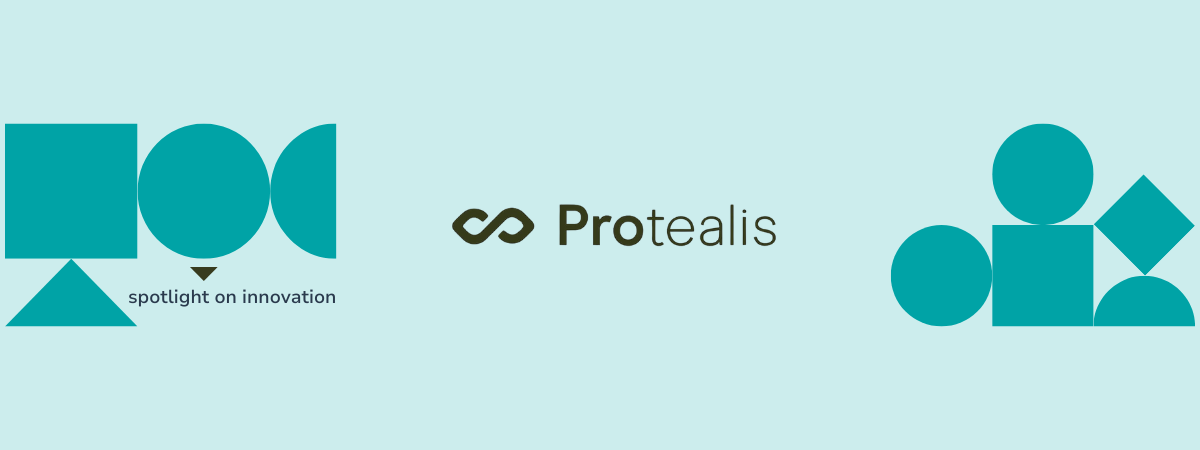Revolutionizing Protein Crop Cultivation in Europe
March 10, 2025
.png)
As the demand for sustainable food production grows, agricultural innovation has never been more crucial. Protealis was founded with a clear mission: to reintroduce legume protein crops to European farmlands. By harnessing advanced breeding technologies and symbiotic microbial innovations, Protealis is setting a new benchmark for legume cultivation – reducing Europe’s dependence on imported protein while mitigating the environmental impact of traditional farming.
Advancing Sustainable Agriculture Through Collaboration
Protealis emerged from a decade-long research initiative at VIB and ILVO, focusing on developing soybean varieties suited to European climates. Currently, Europe imports approximately 70% of its protein, underscoring the urgent need for locally grown alternatives. By combining VIB’s expertise in microbial technologies with ILVO’s advancements in plant breeding, the initiative successfully developed soybean varieties that thrive in local conditions and benefit from symbiotic bacteria that naturally fix nitrogen.
Recognizing the commercial potential, VIB and ILVO appointed industry expert Benjamin Laga as CEO to lead the transition from research to market.
“Beyond technological contributions, VIB played a crucial role in Protealis’ early growth by providing infrastructure, administrative support, and investment. Operating from the VIB incubator, Protealis benefits from shared services that allow it to prioritize innovation and commercialization. Protealis continues to maintain strong ties with VIB, actively engaging in joint research projects funded through VLAIO, further driving agricultural advancements,” says Benjamin Laga, CEO of Protealis.
From Research to Commercial Success
One of the biggest hurdles for R&D spin-offs is transitioning from laboratory breakthroughs to market-ready products. Protealis achieved this with the successful launch of its first soybean varieties. Initially focused on Belgium, the company quickly expanded across Europe, demonstrating the viability of its crops to both investors and farmers.
Building on this success, Protealis secured further investment and broadened its research scope. “We are now advancing our inoculum technology, a microbial coating that enhances nitrogen fixation, reducing the need for synthetic fertilizers and improving crop yield. Moving this product from research to full-scale development marks another milestone in our journey toward sustainable agriculture,” Benjamin states.
Addressing Farmers’ Challenges
European farmers face a range of challenges, from economic pressures to stringent regulatory constraints. Protealis addresses these issues by developing crops that align with both sustainability goals and market demands:
- Profitability & Risk Management: By breeding crops that require fewer agricultural inputs, Protealis helps farmers lower costs and improve financial stability.
- Environmental Regulations: With stricter nitrogen emission policies in Europe, Protealis’ nitrogen-fixing crops provide a compliant, sustainable solution.
- Crop Diversification: Soybeans and legumes regenerate soil, enhance carbon sequestration, and reduce reliance on chemical inputs, making them a valuable addition to crop rotations.
Beyond economic benefits, expanding legume crop cultivation contributes to soil health, climate resilience, and food security. “Keeping soil in good condition is one of the most important assets for farmers, and legumes contribute to this by enhancing soil regeneration and reducing dependency on synthetic fertilizers,” explains Benjamin.
Protealis’ innovations also align with the growing shift toward plant-based diets, reducing reliance on protein imports and mitigating environmental harm caused by deforestation and long-distance transport.

Commercializing Agricultural Innovations
Bringing agricultural products to market is complex, with farmers traditionally cautious about adopting new technologies. To accelerate adoption, Protealis integrates marketing and sales early in development, ensuring a smooth transition from research to commercialization.
New plant varieties must undergo rigorous regulatory approval, including 2–3 years of field trials to confirm distinctiveness, uniformity, and stability (DUS). Microbial inoculants require separate regulatory clearance, typically obtained within six months per country. Protealis is also pursuing EU-wide recognition under the Fertilizer Act to gain broader market access.
The Road Ahead
Protealis recently introduced three new soybean varieties and secured five new registrations in Belgium and Germany. Since its founding in 2021, its product portfolio has expanded to nine soybean varieties, with plans to enter Poland, Hungary, the UK, and Slovakia. The company is also advancing its yellow pea breeding program and exploring direct partnerships with the food industry to establish dedicated supply chains for plant-based protein products.
As Protealis continues to grow, its mission remains clear: to accelerate the transition toward sustainable protein production in Europe. With a rapidly expanding portfolio, increasing market presence, and a strong foundation in science-driven agriculture, Protealis is poised to transform European farming for a more sustainable future.
.jpg)